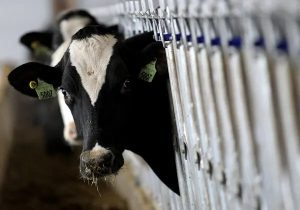
The DNR announced the requirement Monday, two days after the department modified a Wisconsin Pollutant Discharge Elimination System permit for the operation, Kinnard Farms. The permit expires in January 2023.
Environmental groups praised the DNR’s action, the first time the agency has used permitting authority to require a large-scale dairy operation to monitor groundwater pollution around farms. “People who live around Kinnard Farms and other large-scale animal operations rely on groundwater for their drinking water,” said Scott Laeser, program director at Clean Wisconsin. “We have to better understand how much manure pollution is coming off of those farm fields and endangering the drinking water supply.”
In February, Midwest Environmental Advocates and the Environmental Working Group released a report that found animal waste was over-applied to farmland in nine Wisconsin counties. The report concluded that Wisconsin literally does not have enough land for all the manure.
Applying animal waste to farmland is linked to nitrate contamination, Wisconsin’s most common groundwater contaminant. An analysis done by the two organizations also found that direct medical costs for nitrate contaminated drinking water ranged from $23 million to 80 million per year in Wisconsin.
Kinnard Farms was part of a lawsuit that Clean Wisconsin filed arguing that the DNR could require water monitoring in the factory farm permitting process. In July 2021 the Wisconsin Supreme Court issued a ruling that upheld the environmental group’s position.
“As the Supreme Court made clear, DNR can require monitoring for potential polluted runoff from farm fields as part of its permitting process, and they have proposed a sensible plan to do so,” said Laeser. “It’s a critical first step to addressing groundwater contamination.” Because of the ruling, “this farm and many others around Wisconsin are already taking some steps to protect groundwater resources from pollution,” Laeser said. “Effective groundwater monitoring can help us identify potential problems or practices that lead to contamination and also validate whether the important conversation efforts that are already underway are making an impact.”
Kinnard Farms had 7,950 milking and dry cows as of October 2021, according to the DNR. The new permit modifications include additional language on how fields are selected for manure application along with schedules and limits for sampling groundwater for contamination. It also requires the farm to submit a phased plan for the DNR to review and approve.
A 12-page fact sheet on the DNR’s website states: “Kinnard Farms anticipates generating 103,038,952 gallons of manure and processed wastewater and 2,045 tons of solid waste in 2022.” The farm has over 16,000 acres in its nutrient management plan, according to the department.























